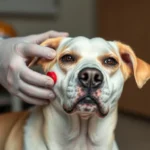
Introduction
Vizslas are an elegant and energetic breed known for their striking looks and affectionate nature. These medium-sized dogs possess a short, rust-colored coat and are renowned for their agility and versatility, making them excellent companions for active families and individuals. However, like all breeds, Vizslas are prone to specific health issues that every owner should be aware of.
Understanding vizsla health issues is crucial for ensuring your furry friend lives a long, happy, and healthy life. This article aims to provide valuable insights and answers to common health concerns associated with Vizslas, emphasizing advice from veterinary professionals.
Understanding Vizsla Health
Overview of Vizsla Characteristics
Vizslas are athletic dogs with a slender build, typically weighing between 45 to 65 pounds. They boast a distinctive short, smooth coat that requires minimal grooming, making them relatively low-maintenance in that regard. One of their most endearing traits is their affectionate nature; Vizslas are known as “Velcro dogs” because they thrive on human companionship and love to be close to their owners.
Their temperament is generally friendly, intelligent, and eager to please, which makes them highly trainable. However, their high energy levels demand regular physical and mental stimulation to prevent boredom and potential behavioral issues.
Common Health Concerns in Vizslas
While Vizslas are generally healthy, they are predisposed to certain genetic conditions and health issues that can affect their well-being throughout their lives. Awareness of these potential problems is essential for early detection and management.
Common health concerns in Vizslas include:
- Hip dysplasia
- Epilepsy
- Skin allergies and conditions
- Eye problems
- Gastric dilatation-volvulus (bloat)
Recognizing these conditions early can lead to better outcomes and a higher quality of life for your Vizsla.
Common Health Issues in Vizslas
Hip Dysplasia
Hip dysplasia is a genetic condition where the hip joint doesn’t fit snugly into the hip socket, leading to arthritis and pain. This condition is particularly common in larger dog breeds but can also affect Vizslas.
Symptoms to Watch For:
– Difficulty rising or jumping
– Lameness or limping
– Decreased activity or reluctance to exercise
– A “bunny hopping” gait
Vet Recommendations for Management and Treatment:
If you suspect your Vizsla may have hip dysplasia, a veterinary examination is crucial. Treatment may include weight management, anti-inflammatory medications, and physical therapy. In severe cases, surgical options like hip replacement may be recommended.
Epilepsy
Epilepsy is a neurological disorder that can lead to recurrent seizures in dogs. Vizslas can be prone to idiopathic epilepsy, which has no known cause.
Signs and Symptoms:
– Sudden, uncontrolled shaking or convulsions
– Loss of consciousness
– Confusion or disorientation after a seizure
Medical Interventions and Lifestyle Adjustments:
If your Vizsla experiences seizures, it’s essential to consult your veterinarian for a proper diagnosis and treatment plan. Medications can help manage the frequency and severity of seizures, and maintaining a consistent routine can also be beneficial.
Skin Issues
Vizslas often experience skin allergies and conditions, resulting in itching, redness, and irritation. Common allergens include pollen, dust mites, and certain foods.
Signs of Skin Problems:
– Excessive scratching or licking
– Red or inflamed skin
– Hair loss or hot spots
Vet Advice on Treatments and Prevention:
Veterinarians may recommend hypoallergenic diets, regular baths with medicated shampoos, and topical treatments to alleviate symptoms. Identifying and avoiding allergens is also essential for prevention.
Eye Problems
Vizslas can be susceptible to various eye conditions, such as cataracts and progressive retinal atrophy (PRA), which can lead to vision loss.
Symptoms and Vet Evaluations:
– Cloudy eyes or changes in eye appearance
– Difficulty seeing, particularly in low light
– Signs of discomfort, such as squinting
Treatment Options and Care Tips:
Regular veterinary eye exams are crucial for early detection. While some conditions may require surgery, others can be managed with medications. Maintaining a clean environment and ensuring proper nutrition can also support eye health.
Gastric Dilatation-Volvulus (Bloat)
Gastric dilatation-volvulus, commonly known as bloat, is a life-threatening condition that occurs when the stomach fills with gas and twists. This condition can affect Vizslas, especially those that eat quickly or are overly active after meals.
Symptoms:
– Swollen abdomen
– Unproductive attempts to vomit
– Restlessness or signs of distress
Urgency of Treatment:
Bloat is a veterinary emergency. If you notice these symptoms, immediate veterinary attention is necessary. Treatment often involves decompression of the stomach and stabilization of the dog.
Preventative Measures and Vet Recommendations:
To reduce the risk of bloat, feed your Vizsla smaller, more frequent meals and avoid vigorous exercise immediately after eating.
Regular Health Check-Ups and Preventative Care
Importance of Regular Vet Visits
Regular veterinary visits are vital for monitoring your Vizsla’s health. A yearly check-up is recommended, though more frequent visits may be necessary for older dogs or those with existing health issues.
What to Expect During a Health Examination:
During a health exam, the vet will check your dog’s weight, heart rate, and overall condition. They may also perform blood tests and vaccinations as needed to keep your Vizsla healthy.
Vaccinations and Preventative Medications
Vaccinations are essential in protecting your Vizsla from various infectious diseases. Common vaccines include:
- Canine parvovirus
- Distemper
- Rabies
- Bordetella (kennel cough)
Preventative Medications:
Heartworm, flea, and tick preventatives should also be part of your Vizsla’s healthcare routine. Discuss with your veterinarian the best options for your dog, considering your local environment and lifestyle.
Nutrition and Diet Considerations
Proper nutrition is fundamental to your Vizsla’s health. A balanced diet tailored to their age, weight, and activity level can help prevent obesity and related health issues.
Recommended Diet for Healthy Vizslas:
Choose high-quality dog food that lists meat as the first ingredient and is free from fillers and artificial additives. Consult your veterinarian for specific dietary recommendations based on your dog’s unique needs.
Importance of Weight Management:
Regularly monitoring your Vizsla’s weight is crucial, as obesity can exacerbate health issues like hip dysplasia and joint problems.
Exercise and Physical Activity
Vizslas are an active breed that requires ample exercise to maintain their physical and mental well-being. Daily physical activity helps keep them healthy and happy.
Recommended Types and Amounts of Exercise:
Aim for at least 60 minutes of exercise daily, which can include walks, runs, playtime, and dog sports like agility or obedience training. Engaging your Vizsla in interactive games can also enhance their mental stimulation.
When to Seek Veterinary Advice
Recognizing Signs of Illness
Being vigilant about your Vizsla’s health is essential. Look for behavioral changes, such as:
- Increased lethargy
- Changes in appetite or drinking habits
- Unusual aggression or withdrawal
Physical Symptoms That Require Attention:
Pay attention to physical signs like vomiting, diarrhea, coughing, or unusual discharge from the eyes or nose, as these can indicate underlying health issues.
Emergency Situations
Certain signs indicate that immediate veterinary care is needed. These include:
- Difficulty breathing
- Severe bleeding
- Signs of pain, such as whining or inability to stand
- Unconsciousness or seizures
If you observe any of these symptoms, contact your veterinarian or an emergency animal clinic immediately.
FAQs About Vizsla Health
Commonly Asked Questions
What are the signs of a healthy Vizsla?
A healthy Vizsla has a shiny coat, clear eyes, normal weight, and a good appetite. They should be active, alert, and playful.
How often should I take my Vizsla to the vet?
Regular check-ups are recommended at least once a year, though older dogs or those with health issues may require more frequent visits.
What are the best practices for Vizsla care?
Maintain a balanced diet, provide regular exercise, schedule routine vet visits, and monitor for any changes in behavior or health.
Vet Answers to Common Concerns
Many owners have misconceptions about Vizsla health, such as believing that all dogs should have the same dietary needs or exercise requirements. It’s essential to recognize that each dog is unique, and personalized care is crucial for their well-being.
Conclusion
Understanding vizsla health issues is vital for any owner committed to ensuring their dog’s well-being. By being aware of common health concerns, maintaining regular veterinary care, and providing a healthy lifestyle, you can help your Vizsla lead a fulfilling life. For personalized advice and tailored health plans, consulting with a veterinarian is always recommended.
It’s important to stay vigilant about your Vizsla’s health and be proactive in addressing any concerns. With the right care and attention, your Vizsla can thrive and remain a cherished member of your family for years to come.









